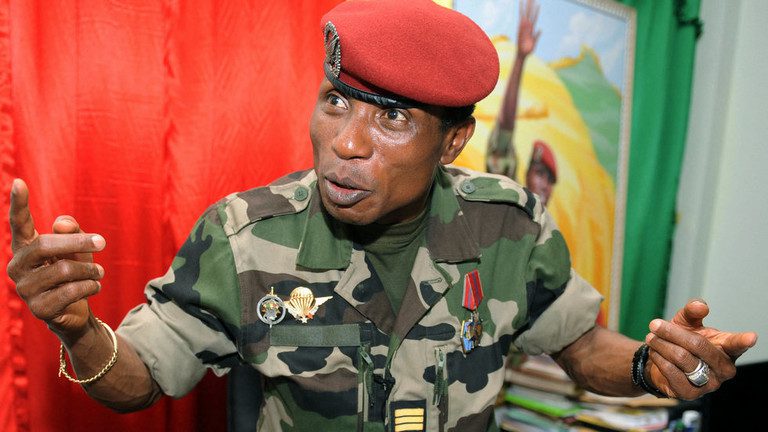Africa
2009 Massacre: Moussa Dadis Camara Sentenced to 20 Years

Former dictator Moussa Dadis Camara has been sentenced to 20 years in prison for his role in the 2009 massacre. Discover the details of the verdict.
On Wednesday, a court in Guinea sentenced former dictator Moussa Dadis Camara to 20 years imprisonment for committing crimes against humanity. This comes after a significant trial regarding the massacre at a political gathering that took place in 2009.
At the conclusion of a historic trial spanning almost two years, seven additional defendants received punishments ranging from life imprisonment to shorter terms.
In September 28, 2009 and the succeeding days thereafter, soldiers, police officers and members of Dadis Camara’s presidential guard brutally put down a rally of opposition in a stadium situated on the outskirts of Conakry with their savage acts.
According to a commission of inquiry mandated by the United Nations, during one of the bleakest eras in West African country’s past, no less than 156 individuals passed away while hundreds were wounded and approximately129 females experienced rape.
The hearing, which victims’ families had eagerly anticipated for almost 15 years, saw a significant deployment of security forces.
Read Also: NPF and PSC Finalize Recruitment Agreement for Police Constables
The court had declared that the charges would be classified as crimes against humanity right before delivering the sentence.
The victims are to receive compensation, ranging from 200 million to 1.5 billion Guinean francs ($23,000 to $174,000), as ordered by the court.
Before the sentencing, Kadiatou Sow emphasized to AFP that this trial holds great significance for her as she was a victim of rape during and after the massacre.
Adding that she desires appropriate punishments in accordance with their crimes, she commented “I want these soldiers to suffer severe consequences.”
Sow’s husband was lost and his body was never found.
Crimes committed against the human race.
Out of the twelve who were accused, ten were present in court to hear the verdict.
As the court in Conakry announced its verdict, ex-military leader Dadis Camara stood still donning a customary boubou of green and yellow.
He was found guilty of plotting to suppress the demonstration and neglecting to reprimand those responsible for its execution.
Dadis Camara, along with 11 other government and military officials, faced allegations of murder, sexual violence, torture as well as abduction and kidnapping.
He consistently refused to take responsibility and instead shifted the blame onto his subordinates.
Beginning on September 28, 2022 – the anniversary of the killings, the trial captivated West Africa with its courtroom spectacle broadcasted on television and radio.
During the trial, a dozen witnesses testified alongside 11 defendants who pointed fingers at one another for the massacre. Additionally, approximately 100 victims gave harrowing testimonies.
Asmaou Diallo, president of an association representing the victims and their relatives of the massacre, informed AFP that all eyes would be focused on the judge before sentencing.
Diallo stated that they have high hopes for the truth to come out and clarity to be gained through this ruling.
Dadis Camara and other defendants were requested to be handed life imprisonment by the head prosecutor.
“Critical juncture.”
The defence counsel contended that re-categorizing the charges as crimes against humanity during the judgment day would deprive them of a chance to present their defense and violate their entitlement to a just trial.
The accused as well as the plaintiffs have a time frame of 15 days to challenge the decision, while two months will be provided to the prosecutor’s office.
Describing it as an eagerly anticipated moment of justice for the victims and their families, Tamara Aburamadan – a legal counsel specializing in international justice at Human Rights Watch- spoke about the impending verdict.
The trial occurred amidst the backdrop of oppression against both Guinea’s military rulers and the media, who oppose them.
The day prior to the trial’s decision, demonstrations against the “enforced absence” of pro-democracy advocates Oumar Sylla and Mamadou Billo Bah brought parts of Conakry to a standstill as clashes between protesters and law enforcement resulted in multiple injuries.
Despite authorities refuting their detention, civil society groups claim that the duo is being detained without communication. As a result, they have urged more protests to be held.
The trial in Guinea has been deemed unprecedented by international organizations and human rights activists.
The UN investigation revealed that the country’s security forces, who are rarely held accountable for their actions, have been challenged by this unique initiative.
